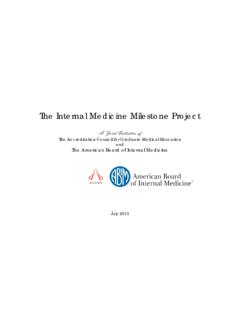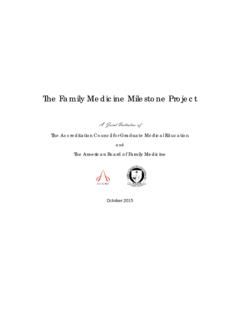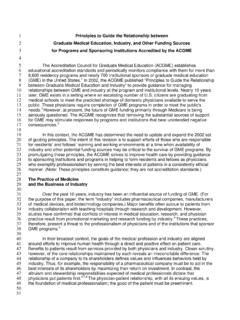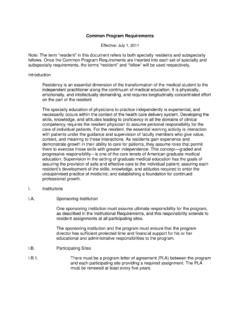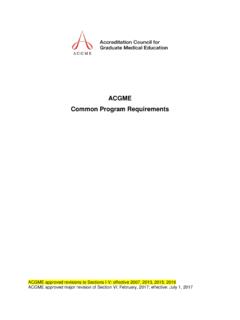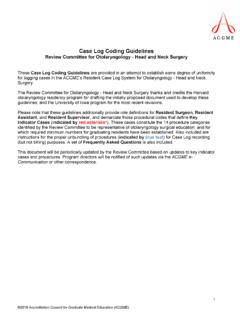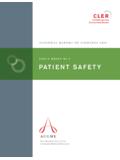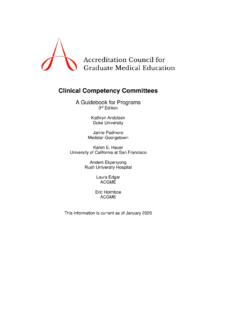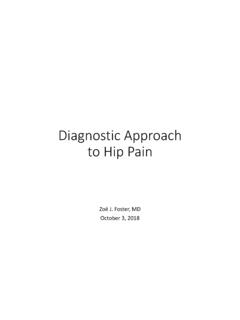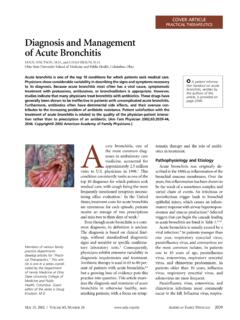Transcription of Common Program Requirements - Accreditation Council for ...
1 ACGME Program Requirements for Graduate Medical Education in internal medicine Editorial revision: effective July 1, 2020. Currently-in-Effect Program Requirements incorporated into the 2020 Common Program Requirements Contents Introduction .. 3. Preamble .. 3. Definition of Specialty .. 3. Length of Educational Program .. 4. I. Oversight .. 4. Sponsoring Institution .. 4. Participating Sites .. 4. Recruitment .. 5. Resources .. 5. Other Learners and Other Care Providers .. 8. II. Personnel .. 8. Program Director .. 8. Faculty .. 13. Program Coordinator .. 17. Other Program Personnel .. 17. III. Resident Appointments .. 18. Eligibility Requirements .. 18. Number of Residents .. 19. Resident Transfers .. 19. IV. Educational Program .. 19. Curriculum Components .. 20. ACGME Competencies .. 21. Curriculum Organization and Resident Experiences .. 27. Scholarship .. 31. V. 34. Resident Evaluation .. 34. Faculty Evaluation .. 37. Program Evaluation and Improvement.
2 38. VI. The Learning and Working Environment .. 42. Patient Safety, Quality Improvement, Supervision, and Accountability .. 43. Professionalism .. 48. Well-Being .. 50. Fatigue Mitigation .. 53. Clinical Responsibilities, Teamwork, and Transitions of Care .. 54. Clinical Experience and Education .. 55. internal medicine 2020 Accreditation Council for Graduate Medical Education (ACGME) Page 2 of 62. ACGME Program Requirements for Graduate Medical Education in internal medicine Common Program Requirements (Residency) are in BOLD. Where applicable, text in italics describes the underlying philosophy of the Requirements in that section. These philosophic statements are not Program Requirements and are therefore not citable. Introduction Graduate medical education is the crucial step of professional development between medical school and autonomous clinical practice. It is in this vital phase of the continuum of medical education that residents learn to provide optimal patient care under the supervision of faculty members who not only instruct, but serve as role models of excellence, compassion, professionalism, and scholarship.
3 Graduate medical education transforms medical students into physician scholars who care for the patient, family, and a diverse community; create and integrate new knowledge into practice; and educate future generations of physicians to serve the public. Practice patterns established during graduate medical education persist many years later. Graduate medical education has as a core tenet the graded authority and responsibility for patient care. The care of patients is undertaken with appropriate faculty supervision and conditional independence, allowing residents to attain the knowledge, skills, attitudes, and empathy required for autonomous practice. Graduate medical education develops physicians who focus on excellence in delivery of safe, equitable, affordable, quality care; and the health of the populations they serve. Graduate medical education values the strength that a diverse group of physicians brings to medical care. Graduate medical education occurs in clinical settings that establish the foundation for practice-based and lifelong learning.
4 The professional development of the physician, begun in medical school, continues through faculty modeling of the effacement of self-interest in a humanistic environment that emphasizes joy in curiosity, problem-solving, academic rigor, and discovery. This transformation is often physically, emotionally, and intellectually demanding and occurs in a variety of clinical learning environments committed to graduate medical education and the well-being of patients, residents, fellows, faculty members, students, and all members of the health care team. Definition of Specialty internal medicine is a discipline encompassing the study and practice of health promotion, disease prevention, diagnosis, care, and treatment of men and women from adolescence to old age, during health and all stages of illness. internal medicine 2020 Accreditation Council for Graduate Medical Education (ACGME) Page 3 of 62. Intrinsic to the discipline are scientific knowledge, the scientific method of problem solving, evidence-based decision making, a commitment to lifelong learning, and an attitude of caring that is derived from humanistic and professional values.
5 Length of Educational Program An accredited residency Program in internal medicine must provide 36 months of supervised graduate medical education. (Core)*. I. Oversight Sponsoring Institution The Sponsoring Institution is the organization or entity that assumes the ultimate financial and academic responsibility for a Program of graduate medical education, consistent with the ACGME Institutional Requirements . When the Sponsoring Institution is not a rotation site for the Program , the most commonly utilized site of clinical activity for the Program is the primary clinical site. Background and Intent: Participating sites will reflect the health care needs of the community and the educational needs of the residents. A wide variety of organizations may provide a robust educational experience and, thus, Sponsoring Institutions and participating sites may encompass inpatient and outpatient settings including, but not limited to a university, a medical school, a teaching hospital, a nursing home, a school of public health, a health department, a public health agency, an organized health care delivery system, a medical examiner's office, an educational consortium, a teaching health center, a physician group practice, federally qualified health center, or an educational foundation.
6 The Program must be sponsored by one ACGME-accredited Sponsoring Institution. (Core). Participating Sites A participating site is an organization providing educational experiences or educational assignments/rotations for residents. The Program , with approval of its Sponsoring Institution, must designate a primary clinical site. (Core). There must be a Program letter of agreement (PLA) between the Program and each participating site that governs the relationship between the Program and the participating site providing a required assignment. (Core). ) The PLA must: ).(1) be renewed at least every 10 years; and, (Core). internal medicine 2020 Accreditation Council for Graduate Medical Education (ACGME) Page 4 of 62. ).(2) be approved by the designated institutional official (DIO). (Core). The Program must monitor the clinical learning and working environment at all participating sites. (Core). ) At each participating site there must be one faculty member, designated by the Program director as the site director, who is accountable for resident education at that site, in collaboration with the Program director.
7 (Core). Background and Intent: While all residency programs must be sponsored by a single ACGME-accredited Sponsoring Institution, many programs will utilize other clinical settings to provide required or elective training experiences. At times it is appropriate to utilize community sites that are not owned by or affiliated with the Sponsoring Institution. Some of these sites may be remote for geographic, transportation, or communication issues. When utilizing such sites the Program must ensure the quality of the educational experience. The Requirements under are intended to ensure that this will be the case. Suggested elements to be considered in PLAs will be found in the ACGME Program Director's Guide to the Common Program Requirements . These include: Identifying the faculty members who will assume educational and supervisory responsibility for residents Specifying the responsibilities for teaching, supervision, and formal evaluation of residents Specifying the duration and content of the educational experience Stating the policies and procedures that will govern resident education during the assignment The Program director must submit any additions or deletions of participating sites routinely providing an educational experience, required for all residents, of one month full time equivalent (FTE) or more through the ACGME's Accreditation Data System (ADS).
8 (Core). The Program , in partnership with its Sponsoring Institution, must engage in practices that focus on mission-driven, ongoing, systematic recruitment and retention of a diverse and inclusive workforce of residents, fellows (if present), faculty members, senior administrative staff members, and other relevant members of its academic community. (Core). Background and Intent: It is expected that the Sponsoring Institution has, and programs implement, policies and procedures related to recruitment and retention of minorities underrepresented in medicine and medical leadership in accordance with the Sponsoring Institution's mission and aims. The Program 's annual evaluation must include an assessment of the Program 's efforts to recruit and retain a diverse workforce, as noted in ).(5).(c). Resources internal medicine 2020 Accreditation Council for Graduate Medical Education (ACGME) Page 5 of 62. The Program , in partnership with its Sponsoring Institution, must ensure the availability of adequate resources for resident education.
9 (Core). ) The Program , in partnership with its Sponsoring Institution, must establish the internal medicine residency within a department of internal medicine . (Detail) . ) The Program , in partnership with its Sponsoring Institution, must provide the broad range of facilities and clinical support services required to provide comprehensive care of adult patients. (Core). ) The Program , in partnership with its Sponsoring Institution and participating sites, must provide access to an electronic health record. In the absence of an existing electronic health record, institutions must demonstrate institutional commitment to its development, and progress towards its implementation. (Core). ) The Program , in partnership with its Sponsoring Institution and participating sites, must provide residents with access to training using simulation. (Detail). ) The Program , in partnership with its Sponsoring Institution, must ensure that the Program has the following: cardiac catheterization.
10 Bronchoscopy; gastrointestinal endoscopy; non-invasive cardiology studies; pulmonary function studies; hemodialysis; and imaging studies, including radionuclide, ultrasound, fluoroscopy, angiography, computerized tomography, and magnetic resonance imaging. (Detail). ) The Program , in partnership with its Sponsoring Institution, must ensure that the Program has adequate clinical and teaching space must be available, including meeting rooms, classrooms, examination rooms, computers, visual and other educational aids, and office space for teaching staff members. (Core). ) The Program , in partnership with its Sponsoring Institution, must ensure that the Program director is able to supervise any internal medical subspecialty programs sponsored by the institution and linked to the core Program to ensure compliance with ACGME. Accreditation Requirements . (Core). The Program , in partnership with its Sponsoring Institution, must ensure healthy and safe learning and working environments that promote resident well-being and provide for: (Core).
